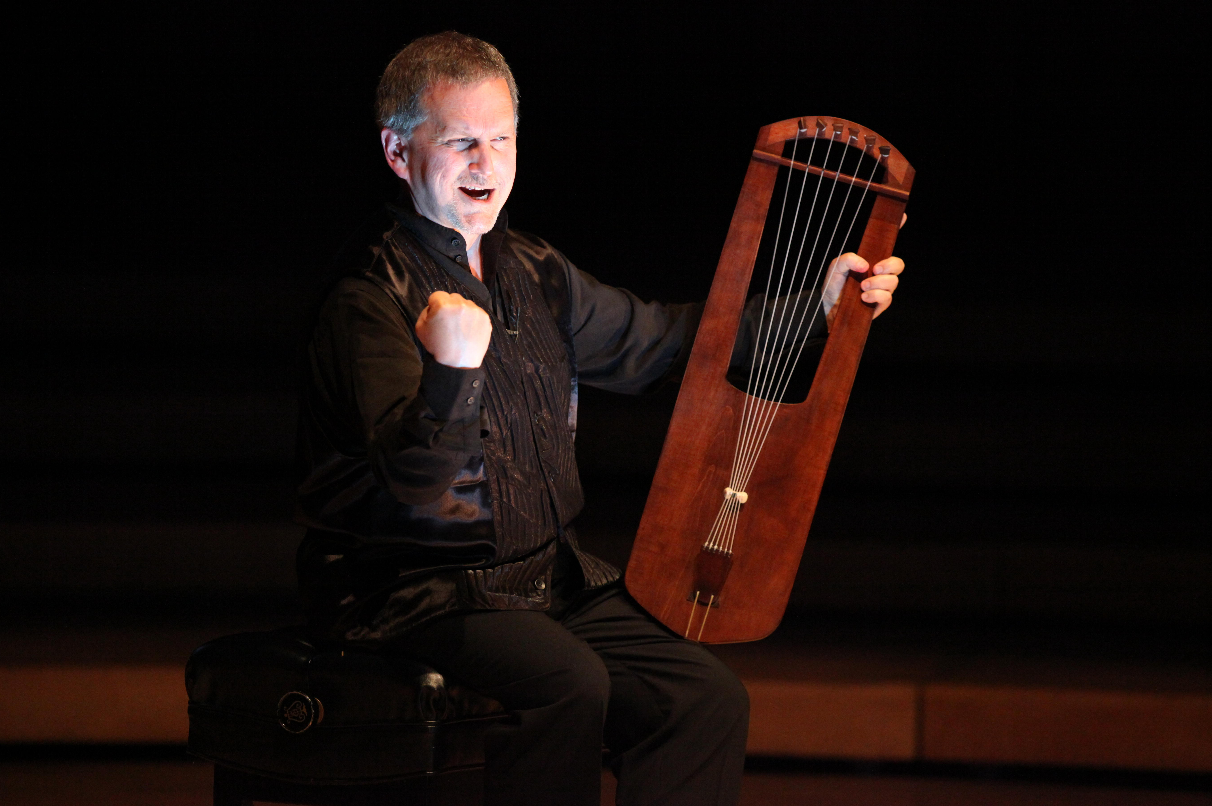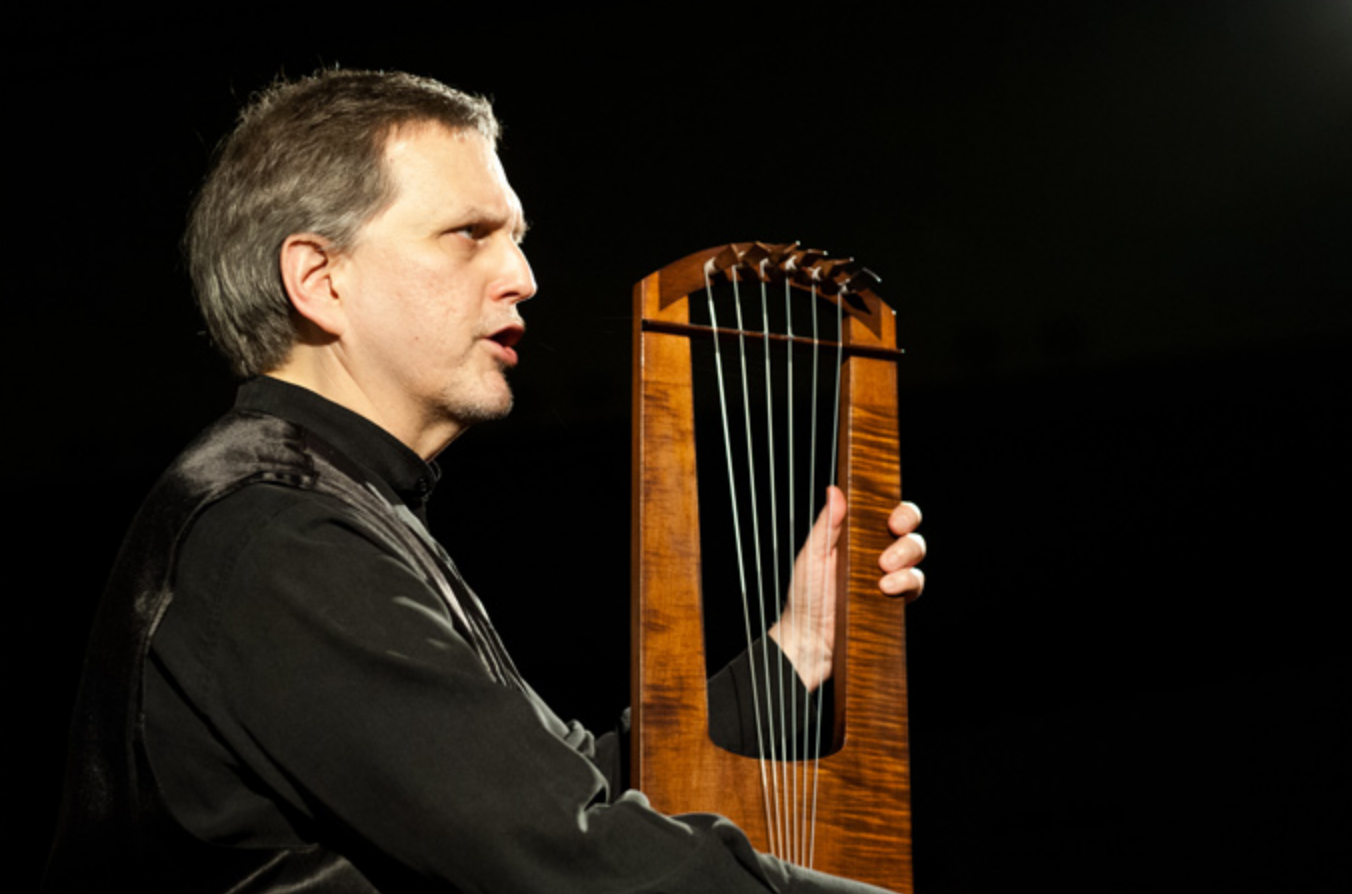Corpus Christi Church, West 121st Street, Manhattan
September 30, 2018
No one quite knows when the Anglo-Saxon epic poem Beowulf became a thing. Estimates range from the sixth century up until the early eleventh, which is the date of the sole existing manuscript, but whatever your guess, it’s definitely an ancient story. A tale of heroes and monsters, Beowulf harks back to a time when audiences in early medieval England would gather round a hearth and a singer of tales, or scop, would employ all of his skill and imagination to enthrall and entertain. The narrative would vary, depending on the scop and his mood on any given occasion – that was typical of this kind of oral story-telling – and he would season his story by accompanying himself on a six-stringed harp, as is known from contemporary accounts and surviving instruments. Fast forward 1500 years or so and Benjamin Bagby is that scop.
 Benjamin Bagby recites Beowulf. Photo © Hillary Scott
Benjamin Bagby recites Beowulf. Photo © Hillary Scott
In fact, Bagby, a native of the Great Lakes, can trace his family origins to a Germanic clan, which emigrated from Jutland to somewhere in the north of England c. 630. So, it’s well and truly in the genes, as they say. Not that proof is required, mind, for Bagby possesses a quite remarkable authenticity, as evidenced by his thrilling recitation of the first third of what, in its complete form, could be a four to six-hour performance. His ancient ancestor might have been a bit hairier, and likely less well kempt, but Bagby’s Beowulf, an interpretation honed over the last 20 years, has authority, imagination and chutzpah. If the thought of learning six hours of ancient Anglo Saxon sets the mind a-jangle, prepare to be amazed, entertained and generally boggled.
Like all the best stories, Beowulf is laced with colourful incident and diverting digressions, but the first third essentially tells how the titular hero sails from Norway to rescue Hrothgar, King of the Danes from the nocturnal depredations of Grendel, a dourly grim and fearsome beastie who lurks out in the misty marshes nearby. Quelling his audience with the traditional cry of “Hwaet!” – that’s “listen”, or more likely “shut up you lot” in ancient Anglo-Saxon, Bagby launches into his spoken prelude with a gleam in his eye and an abundance of simple, yet effective gestures. His introduction over, he touches his harp – a replica of an ancient grave-find, strung to offer three perfect fifths and two perfect fourths – as his voice begins to rise from speech to sprechgesang, and ultimately into song, with many a subtle shading in between.
The story’s lyrical portions, such as the burial at sea of Scyld, the first Danish King, or Beowulf’s journey, draw forth rippling accompaniments. Lively sections, like Hrothgar’s success in battle or the building of his famous hall, Hereot, and the numerous subsequent feastings, are supported by rhythmic music akin to folk dance, Scottish reels or even the occasional hint of bluegrass (or more likely a common root to all three). All the time, Bagby’s mellifluous baritone rises and falls, growling with demonic pleasure as Grendel devours 30 thanes in one sitting and rising to an ululating yodel when their comrades discover the tragedy the next morning.
 Benjamin Bagby. Photo © Susanna Drescher
Benjamin Bagby. Photo © Susanna Drescher
Swaying on his seat, Bagby regularly holds his harp close to his ear, his whole being attuned to its every mood. His characterisations of the grave Hrothgar, the cocksure Beowulf or the nay-saying vassal Unferth are magically observed. Journeys spur him on, the pace quickening, the music making the toes tap. Drink – and in Heorot, more beer flows than at one of Brett Kavanaugh’s frat parties – draws forth a grin. He’s powerfully effective too at suggesting the dark fiend prowling the dismal moor and the dangers attendant to the lone traveller. The ear attunes surprisingly quickly to the ancient speech rhythms, and with references to middle-earth, elves, trolls and orcs, we are on ground familiar from the tales of JRR Tolkien. Still, there is a frisson of pleasure when an ancient word is easily deciphered, such as God, father, weapons, war, sand, ship or anchor.
After about an hour, a slightly husky Bagby stopped momentarily to explain that even in the seventh and eighth centuries, a scop might get a cold. But, as he bravely told us, no one was interested in an ancient storyteller’s excuses so in that spirit he intended to continue. Riveted by his bravura performance thus far, I doubt anyone had noticed, and the best was yet to come, with the fight in Hrothgar’s hall a tour de force of music and drama culminating in the joyless Grendel – chillingly described as a Sceadugenga, or shadow-walker – fleeing to his doleful lair, leaving an entire grisly arm in the vice-like grasp of the triumphant Beowulf.
If you’ve ever wondered what storytelling was like in the days before the written word, Benjamin Bagby’s Beowulf is a once-in-a-lifetime event – a uniquely brilliant experience that is as close as you’ll get to what it must have been like for a Northlander sitting around a great log fire and listening to the telling of a tale. However, if you want to know what happens when Grendel’s mother rocks up, you’ll have buy the book…
Music Before 1800’s program continues with Vox Luminis on October 28














Comments
Log in to join the conversation.